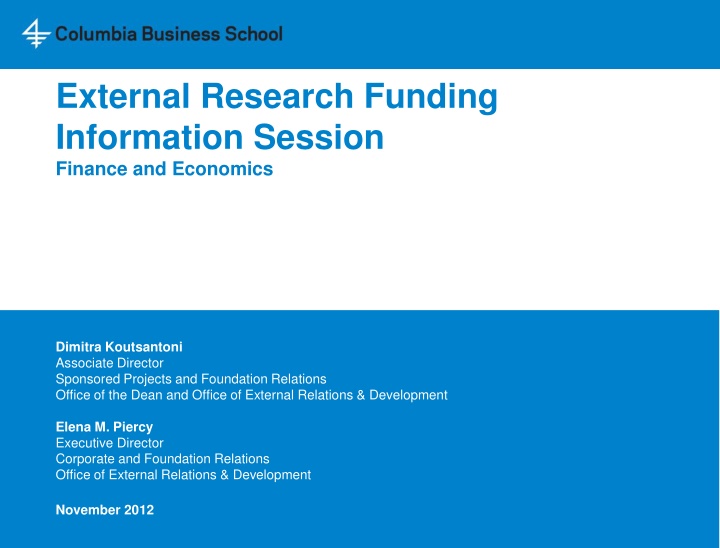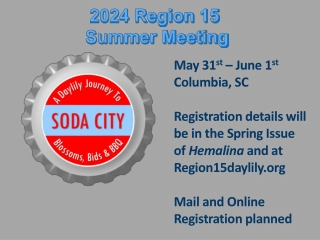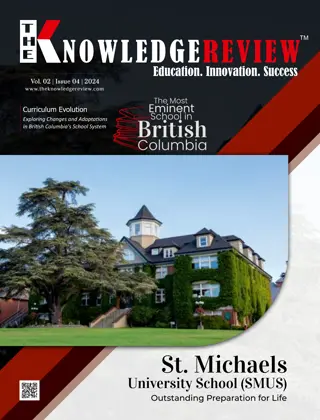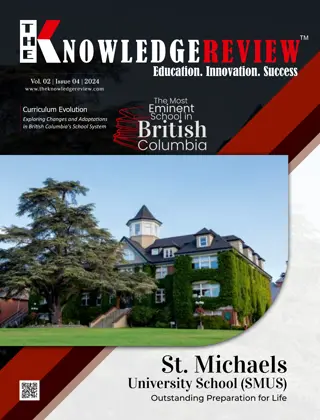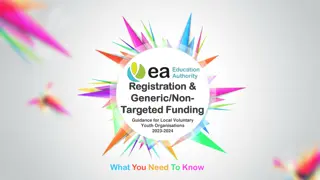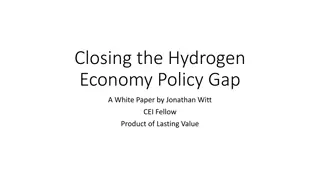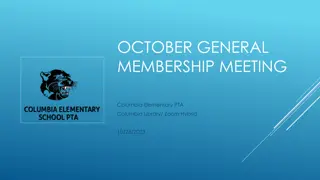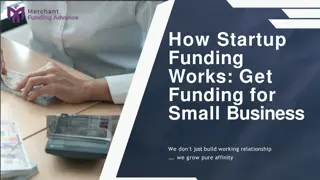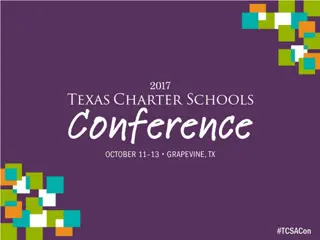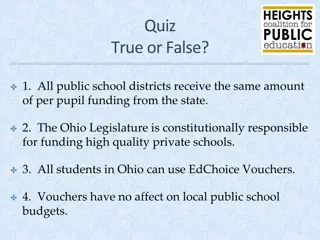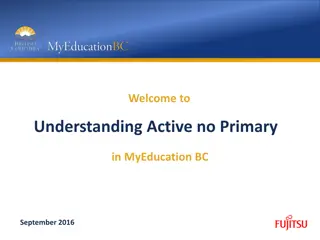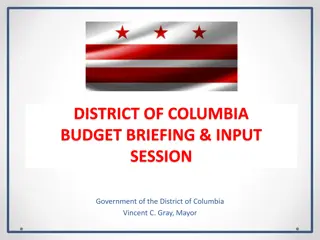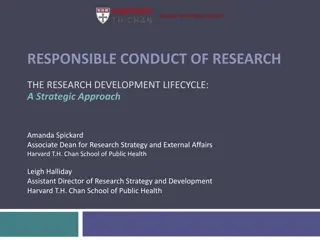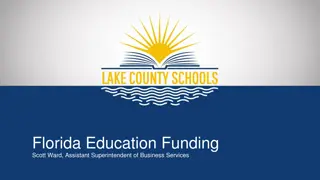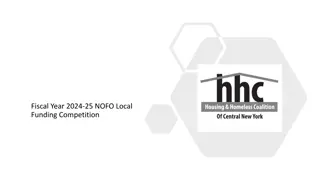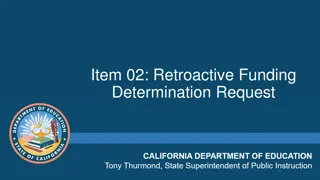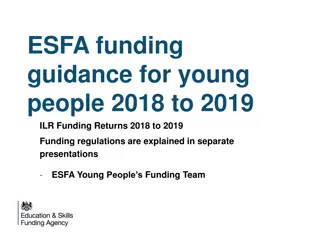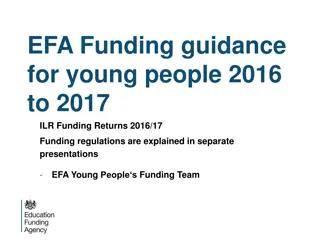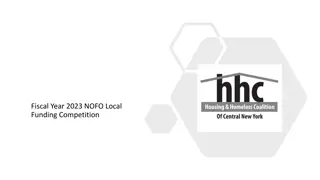Columbia Business School Research Funding Overview
Information session on external research funding opportunities for Columbia Business School faculty, including sponsor institutions, sample grants, administrative support, and application processes. Details on funding from federal agencies like NSF in social, behavioral, economic, and mathematical sciences.
Download Presentation

Please find below an Image/Link to download the presentation.
The content on the website is provided AS IS for your information and personal use only. It may not be sold, licensed, or shared on other websites without obtaining consent from the author.If you encounter any issues during the download, it is possible that the publisher has removed the file from their server.
You are allowed to download the files provided on this website for personal or commercial use, subject to the condition that they are used lawfully. All files are the property of their respective owners.
The content on the website is provided AS IS for your information and personal use only. It may not be sold, licensed, or shared on other websites without obtaining consent from the author.
E N D
Presentation Transcript
External Research Funding Information Session Finance and Economics Dimitra Koutsantoni Associate Director Sponsored Projects and Foundation Relations Office of the Dean and Office of External Relations & Development Elena M. Piercy Executive Director Corporate and Foundation Relations Office of External Relations & Development November 2012
Session Overview Which institutions most commonly sponsor business school research? Federal agencies Private foundations Corporations (including corporate foundations) Other independent organizations Which organizations have supported Columbia Business School research? What type of administrative support is available to faculty in this area? How can I find out about funding opportunities? What is the application process? Columbia Business School 2
Federal Agencies NSF (1) NSF Program Focus Sample grants funded at Columbia Business School (previous and current) Directorate for Social, Behavioral and Economic Sciences Social and Economic Sciences (SES): Economics Supports research in almost every area of economics, including : econometrics, economic history, environmental economics, finance, industrial organization, international economics, labor economics, macroeconomics, mathematical economics, and public finance. Mayer, Piskorski and Morrison: Understanding the Determinants of Household Default Decisions in the Mortgage Crisis ($347,811 granted over three years) Nakamura: Price Adjustment, Exchange Rate Policy, and Monetary Models ($419,833 granted over three years) Success rates: 20% - 30% of the proposals submitted in a round are typically funded. Jiang: Collaborative Research: Predatory Lending, Predatory Borrowing, and the Mortgage Crisis: Evidence from Loan-Level Data from a Large Bank ($247,563 granted over three years) Average Grant Size: About $75,000 per year (including indirect costs). Duration: The typical duration is 3 years. Due dates: January and August, annually. Columbia Business School 3
Federal Agencies NSF (2) NSF Program Focus Sample grants funded at Columbia Business School (previous and current) Directorate for Mathematical and Physical Sciences Division of Mathematical Sciences (DMS): Computational Mathematics Supports mathematical research in areas of science where computation plays a central and essential role, emphasizing design, analysis, and implementation of numerical methods and algorithms, and symbolic methods. Broadie, Glasserman and Kou: Computational Methods in Risk Management and Financial Engineering ($564,331 granted over three years) Due date: December, annually Columbia Business School 4
Federal Agencies NSF (3) NSF Program Focus Sample grants funded at Columbia Business School (previous and current) CAREER Supports junior faculty (assistant professors) Zeevi (SES): CAREER: Design and Analysis of Differentiated Services ($399,825 granted over five years) Duration: The typical duration is five years. Due date: July, annually Nakamura (Economics): CAREER: Integrating Micro and Macro Evidence on Price Dynamics ($457,976 granted over five years) Grant Opportunities for Academic Liaison with Industry (GOALI) Promotes university-industry partnerships by making project funds or fellowships/traineeships available to support an mix of industry-university linkages. Special interest is focused on affording the opportunity for: Faculty, postdoctoral fellows, and students to conduct research and gain experience in an industrial setting; Industrial scientists and engineers to bring industry's perspective and integrative skills to academe; and Interdisciplinary university-industry teams to conduct research projects. None granted to date. Due dates: Align with program area deadlines. Columbia Business School 5
Federal agencies-Social Security Administration Relevant Program Areas Sample grants funded at Columbia Business School (previous and current) The Social Security Administration's Office of Acquisition and Grants (OAG) funds research and demonstration grants involving: Eric Johnson: SSA supplement for project: Decision-Making Over the Lifespan: How Memory Affects Preferences ($90,000 ) Old-Age Survivors Program Social Security Disability Insurance Program (SSDI) Supplemental Security Income (SSI) Program. Grants are awarded for innovative research and demonstrations, adding to existing knowledge and improve methods and techniques for managing, administering, and the effectiveness of SSA programs. RFPs are announced periodically Columbia Business School 6
Private Foundations (1) Foundation Relevant Program Areas Sample grants funded at Columbia Business School (previous and current) Alfred P. Sloan Foundation Economic Institutions, Behavior and Performance: Economic Implications of the Great Recession Behavioral Economics and Household Finance Economic Analysis of Science and Technology Empirical Economic Research Enablers Eric Johnson: Mindsetting: A New Dimension for Choice Architecture and Choice Engines ($124,948) Eric Johnson: Accounting for Tastes and Skill: The Impact of Individual Differences on Annuity and Post- Mortgage Decision Making ($85,682) LOIs can be submitted at any time Russell Sage Foundation Assaf Shtauber: The Effects of Access to Mainstream Financial Services on the American Poor ($7,500) Behavioral Economics Small Grants Program in Behavioral Economics ($7,500) Small grants program in Consumer Finance ($7,500) Proposals can be submitted at any time Columbia Business School 7
Private Foundations (2) Foundation Relevant Program Areas Sample grants funded at Columbia Business School (previous and current) Ford Foundation Economic Fairness Building Economic Security Over a Lifetime Ensuring Good Jobs and Access to Services Expanding Livelihood Opportunities for Poor Households Improving Access to Financial Services Promoting the Next-Generation Workforce Strategies None granted to date. LOIs can be submitted at any time Peter G. Peterson Foundation Fiscal outlook Spending Taxes Health care Personal finances None granted to date. LOIs can be submitted at any time Columbia Business School 8
Private Foundations (3) Foundation Relevant Program Areas Sample grants funded at Columbia Business School (previous and current) Rockefeller Foundation None granted to date. Protecting American Workers Economic Security: Campaign for American Workers (Shaping plans, products, and policies to provide a modern economic safety net). Advancing Innovation Processes to Solve Social Problems: Building models to expand the use of cutting-edge innovation methods to achieve social impact. Harnessing the Power of Impact Investing: Expanding and increasing the effectiveness of investments that solve social and environmental problems and generate a profit. LOIs can be submitted at any time Templeton Foundation SIPA and ISERP: Program on Indian Economic Policies: Free Trade, Democracy, and Entrepreneurial Development ($3,500,000) Note: originally awarded to the Business School, and subsequently moved to SIPA. Freedom and Free Enterprise Supports a range of programs intended to liberate the initiative of individuals and nations and to establish the necessary conditions for the success of profit-making enterprise. Due dates: April and October, annually Columbia Business School 9
Private Foundations (4) Foundation Relevant Program Areas Sample grants funded at Columbia Business School (previous and current) FINRA Investor Foundation Financial literacy and education: Funds educational projects or programs and research that expands the body of knowledge and offers solutions in the field of investor education and protection. None granted to date. LOIs can be submitted at any time National Endowment for Financial Education Eric Johnson: Cognitive Capabilities, Decision- Making Ability, and Financial Outcomes Across the Lifespan ($165,000) Financial Literacy Project outcomes should be: actionable in the field of financial literacy, directly relevant to the financial well-being of the public, and able to be applied broadly. Due dates: December and June Columbia Business School 10
Private Foundations (5) Foundation Relevant Program Areas Sample grants funded at Columbia Business School (previous and current) Robert Wood Johnson Foundation Focused on improving both the health of everyone in America, and their health care by improving systems through which people receive care and by fostering environments that promote health and prevent disease and injury Human Capital : prepares health professionals for leadership, support scholars in their research, and promote diversity in order to build a skilled health care workforce ready to address the health, cost and quality challenges facing the nation. Public Health: concerned with strengthening public health systems by gathering data about best practices for improving public health, advancing smarter laws and policies, and strengthening public health departments. None granted to date. RFPs are announced periodically The Commonwealth Fund None granted to date. Health Reform Policy Affordable Health Insurance Commission on a High Performance Health System Federal and State Health Policy Payment and System Reform LOIs can be submitted at any time Columbia Business School 11
Corporations (including Corporate Foundations) Corporation Stated Priority Areas Sample grants funded at Columbia Business School (previous and current) Offers credit cards processing and distribution services for Citigroup. The company additionally provides marketing, credit analysis, and portfolio management services. Trevor Harris, Stephan Meier , and Bob Phillips Improvement of targeting and profitability of credit card offers ($35,000) Citicorp Credit Services Citigroup Foundation Financial Capability and Asset Building Microfinance Enterprise Development College Success (in the U.S.) Youth Education and Livelihoods (outside the U.S.) Neighborhood Revitalization (in the U.S.) Disaster Response Bruce Kogut (Bernstein Center) Individual Business & Society (IBS) Program, which focuses on corporate social responsibility, corporate governance issues, ethics, and leadership. It has provided support for research, case studies, curricular development and events since 2002. (Appx. $1,200,000; 2002 Present) Ernst & Young Community engagement Education Entrepreneurship Environmental sustainability Donna Hitscherich Private Equity Deal Camp ($87,500) Columbia Business School 12
Corporations (including Corporate Foundations) (2) Corporation Stated Priority Areas Sample grants funded at Columbia Business School (previous and current) Goldman Sachs Foundation Entrepreneurship and innovation Helping Military Veterans Return to Civilian Life Scholarships and Need-Based Financial Aid Murray Low (Lang Center) 10,000 Women: Development of Business and Management Education in Emerging Economies for Underserved Women ($1,500,000) Economic Development: Supportsprograms aimed at microfinance and workforce development, both of which enable people to become financially independent and help to create opportunities for the next generation. Paul Glasserman $42,000 Moody s Foundation Suresh Sundaresan $30,000 Moody's Credit Market Research Fund (CMRF) Topics of interest include: Credit risk and analysis Default risk asset valuation Capital and credit markets Market microstructure derivatives (especially credit derivatives) Regulatory practices Econometric and statistical methods for credit analytics Portfolio theory performance attribution Microfinance institution risk LOIS and proposals can be submitted at any time Columbia Business School 13
Corporations (including Corporate Foundations) (3) Corporation Stated Priority Areas Sample grants funded at Columbia Business School (previous and current) Financial Literacy Education Economic Opportunity Entrepreneurship None granted to date. NYSE Euronext Foundation Proposals can be submitted at any time Aim: to promote learning about capital formation, financial markets and entrepreneurship through innovative educational programs . None granted to date. NASDAQ OMX Educational Foundation Supports grants and PhD dissertations Due dates: February and August annually Santander Global group providing every type of financial service to all types of customer: individuals, companies, institutions Nelson Fraiman ECLA Program: a multifaceted grant, with some support for research and special academic programs as well as the delivery of a custom program ($755,000) Columbia Business School 14
Other Independent Organizations (1) Organization Relevant Program Areas Sample grants funded at Columbia Business School (previous and current) Institute for New Economic Thinking (INET) Financial Instability and Macroeconomic Management Political Economy of Income and Wealth Distribution and Inequality Dynamics Governance of the International Monetary and Financial Systems Innovation Joseph Stiglitz INET Taskforce in Macroeconomic Efficiency and Stability: Networks and Externalities ($638,000) RFPs are announced for grants of $25,000- $250,000 in June annually W.E. Upjohn Institute for Employment Research Support for junior faculty (untenured and within six years of earning a PhD) to carry out policy-related research on labor market issues. The Institute supports and encourages research on all issues related to labor markets and is especially interested in topics related to the recent recession and current recovery. Maria Guadalupe The Value and Consequences of Giving Shareholders a Say on Pay ($10,000) Grants of $5,000 Due date: February, annually Columbia Business School 15
Other Independent Organizations (2) Organization Relevant Program Areas Sample grants funded at Columbia Business School (previous and current) Network for Studies on Pensions, Aging and Retirement (Netspar) Risk management during working life Risk management during retirement years The art of choosing Supervision of fully funded pensions: solvency and transparency Risk sharing and distribution among generations: full funding, pay-as-you-go, taxation The labor market Heterogeneity within generations and the position of senior citizens Andrew Ang Aspects of Long Horizon, Illiquidity, and Long- Run Tail Risk for Portfolio Strategies ( 250,000) Grant maximum of 10,000 Due date: May annually Inquire Europe Provides financial support for academic research projects with potential applications in the field of investment management. Charles Jones Revealing Shorts: an Examination of Large Short Position Disclosures ( 10,000 ) Grant maximum: 10,000 Next deadline for submission: 16 January 2013 Columbia Business School 16
Other Independent Organizations (3) Organization Relevant Program Areas Sample grants funded at Columbia Business School (previous and current) Institute for Quantitative Research in Finance (the Q Group) Provides financial support for superior academic research projects with potential applications in the field of investment management. Wei Jiang -Hedge Funds Activism, Corporate Governance, and Firm Performance (2006) -Do Institutional Investors Have an Ace up Their Sleeves? Evidence from Confidential Filings of Portfolio Holdings (2009) Grant maximum: $10,000 Due date: August annually Andrew Ang Downside Risk, Cross-Sectional Equity Returns and the Momentum Effect (2001) Columbia Business School 17
Main Liaisons Primary liaisons to support CBS faculty applying for institutional grants: Dimitra Koutsantoni, PhD Dean s Office and Office of External Relations & Development Elena Piercy Office of External Relations & Development Columbia Business School 18
How we can support you We maintain access to a growing network of grantmaking organizations and individual supporters (including 41,000 alumni) of the School. The department s relationship management includes a tracked understanding of historic relationships with the Business School and the broader University. We research and identify suitable funding prospects and support all stages of the application process. This includes: Development of the application strategy including focus areas and request amount; Development and submission of letters of inquiry and proposals; Facilitation of meetings and conversations with prospective funders; and Administrative support to close, process, and steward gift and grant agreements. We engage alumni ambassadors and business leaders who are familiar with the internal workings of various funding agencies/grantmaking organizations, which may help raise the visibility of your proposal request. We are actively engaging nearly 200 corporate sponsors at a given time who are interested in partnering with Business School faculty on research and seeking meaningful connections with research and activities. We are constantly seeking fits for these inquiries and interest areas with the work of our faculty. Columbia Business School 19
Dissemination of funding opportunities We research funding opportunities and circulate them via: A monthly research newsletter developed and disseminated by Dimitra Koutsantoni. Targeted outreach to faculty about specific opportunities as they arise. We organize external funding information sessions every fall semester; and We conduct prospect research for specific projects upon request. Columbia Business School 20
Research grant application procedure Research grant applications are processed through Dimitra Koutsantoni, who also serves as the Business School liaison to the University s Sponsored Projects Administration (SPA). Dimitra, in coordination with SPA, ensures that all applications go through internal authorization procedures and comply with the University s and funders policies and guidelines. All applications to federal agencies and all full proposal grant submissions to private foundations and other organizations are required to go through the Dean s Office and SPA. Proposals for unrestricted gifts are not included in this mandatory process. Columbia Business School 21
For information: Grants vs Gifts Grants contract/research agreement specific statement of work detailed budget specific deliverables specified period of performance reporting unexpended funds must be returned to sponsor Gifts may be for specific purpose But no contractual requirements no specified period of performance no specified deliverables Columbia Business School 22
How we can work together: next steps Please let us know if: You have a research project that needs funding (new or existing). You would like to extend funding for a particular project. You would like to request a no-cost extension for a project. You need support with submitting progress or final reports for a grant. You have identified a particular sponsor and you are in the process of putting together a letter of inquiry or proposal. You have an existing relationship with a funder and you need support in furthering it. We are looking forward to working with you. Columbia Business School 23
Contact us Dimitra Koutsantoni Associate Director Sponsored Projects and Foundation Relations Office of the Dean and Office of External Relations and Development dk2617@columbia.edu Elena M. Piercy Executive Director Corporate and Foundation Relations Office of External Relations and Development emp2167@columbia.edu Columbia Business School 24
